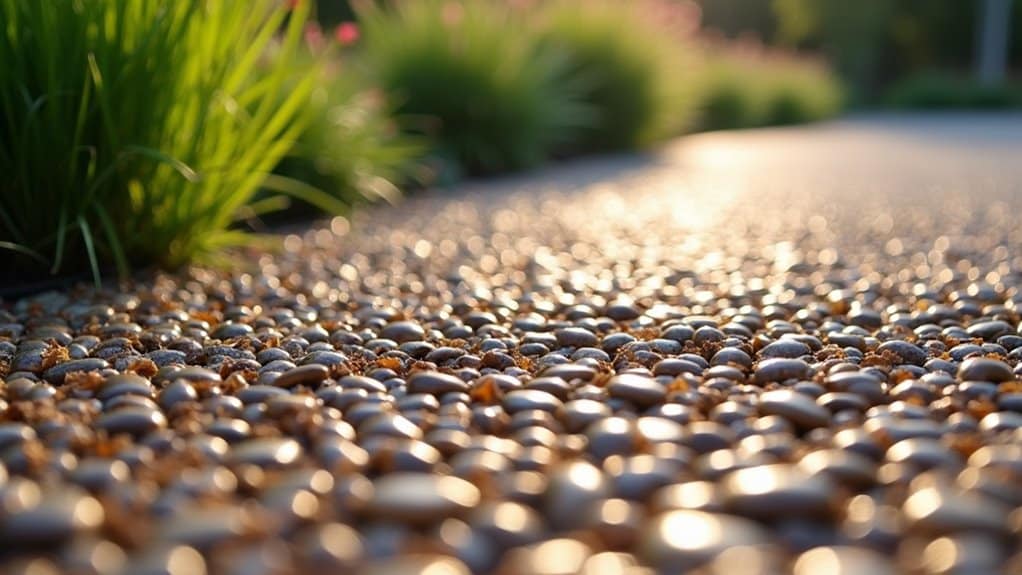Quality resin bound systems typically last 15-25 years when properly maintained. A sound installation requires a well-compacted sub-base of 100-250mm, ensuring long-term stability. These surfaces incorporate environmentally-friendly materials and UV-resistant resins that maintain their colour, much like a well-protected garden fence. The system's excellent drainage capabilities meet SuDS requirements, effectively managing British rainfall and preventing puddles – particularly useful for our wet climate. Regular upkeep, such as occasional brushing and pressure washing, keeps the surface in top condition. Consider these features carefully when planning your resin bound project.
Key Takeaways
Key features of quality resin bound surfacing:
- Top-grade resins and sorted aggregates create tough, reliable surfaces perfect for driveways and paths.
- UV-resistant resins keep colours bright and true, even under harsh British weather.
- Water-permeable surface handles heavy rain effectively, meeting local drainage requirements and preventing puddles.
- Professional fitting by qualified installers ensures the surface stays firm and level, saving on repairs down the line.
- Environmentally conscious options use recycled materials and low-emission resins – brilliant for eco-minded homeowners whilst maintaining strength.
Durability and Lifespan
A properly installed resin bound driveway typically lasts 15-25 years, though several key factors affect its longevity.
The foundation is crucial – a well-prepared sub-base prevents cracking and stability issues. It's worth choosing experienced installers who understand British weather conditions and local building regulations, as expert base preparation is essential for structural integrity.
Proper drainage is essential to prevent water damage, particularly given the UK's wet climate. The correct mixing and laying of materials directly impacts how well the resin bonds with the stones, affecting both strength and looks.
Colour choices matter beyond aesthetics – high-quality UV-stable resins resist fading from British sunshine, whilst premium aggregates boost overall performance. In fact, professionally installed resin-bound surfaces can last up to 25 years or more, showcasing their durability.
Regular upkeep, including periodic cleaning and checks each season, helps spot and sort any wear before it becomes serious.
Simple maintenance keeps your driveway looking smart and performing well:
- Sweep regularly to remove debris
- Clean spills promptly
- Check drainage points after heavy rain
- Address any cracks early
With proper installation and care, your resin bound driveway should serve as a durable, attractive entrance to your property for many years.
High-Quality Materials
High-Quality Materials
Quality materials are vital for resin bound surfaces. Choose durable resins to ensure your installation lasts, and consider eco-friendly options that look great whilst being kinder to the environment. These choices affect both the longevity and visual appeal of your project, much like selecting premium paint for your home's exterior. Additionally, using graded and processed aggregates is essential for achieving optimal results and ensuring surface integrity. The selection of high-quality aggregates can significantly enhance the overall performance of your driveway. Smart material selection at the start prevents costly repairs later.
Durability of Resin Materials
The durability of resin materials matters greatly for their practical use, with several vital features determining how well they perform. Impact resistance is crucial, particularly when making tough prototypes or parts that move and wear. While durable resins can take heavy knocks without failing, some otherwise strong resins can be quite brittle.
Think of flexural properties as the material's ability to bend without breaking. Much like a plastic ruler that can flex yet return to shape, resins need the right mix of rigidity and flexibility. This balance proves especially important in parts that face regular movement or stress. The ultimate tensile strength of durable resin is around 28 MPa, indicating its ability to withstand significant forces.
Heat and chemical resistance round out the key factors. Just as a kitchen worktop needs to withstand hot pans and cleaning products, resins must cope with harsh conditions without breaking down.
Ceramic-based resins handle chemicals well but can be rather fragile. The trick lies in choosing a resin that combines strength, flexibility and thermal stability to suit the job at hand.
Eco-Friendly Material Options**
Eco-friendly resin bound systems offer both practical benefits and environmental advantages.
These systems use sustainably sourced materials, including natural and recycled aggregates like crushed glass and plastic, which help reduce landfill waste whilst conserving raw materials. Additionally, the incorporation of recycled content allows for a significant reduction in the demand for virgin resources, further enhancing their sustainability profile.
The systems feature low VOC resins that minimise environmental impact and meet UK environmental standards. A key benefit is their excellent permeability, which helps manage rainwater effectively and complies with SUDS regulations – particularly important for British weather conditions.
These materials require less energy to manufacture compared to traditional options, resulting in a smaller carbon footprint.
Installation produces minimal waste, and many surfaces can be recycled at the end of their life.
Choosing an eco-friendly resin bound system provides a durable, attractive surface that's both environmentally responsible and adds value to your property.
UV Stability
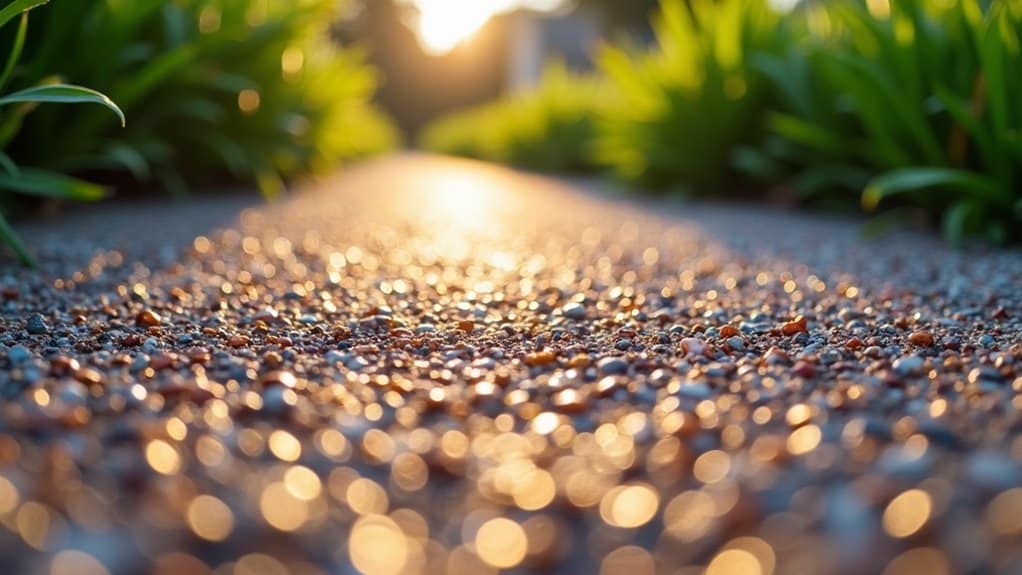
UV stability is crucial for resin bound surfaces, particularly in outdoor settings across the UK.
UV stable resins maintain their original colour and vibrancy, even when exposed to harsh sunlight – much like quality garden furniture that doesn't fade over time.
These resins offer significant advantages over non-UV stable alternatives, which often turn yellow or darken, similar to how old plastic garden items discolour.
The UV stable option keeps surfaces looking fresh and uniform, whilst providing enhanced durability against cracking and general wear. A key ingredient, aliphatic polyurethane, resists sun damage effectively, making it ideal for British weather conditions. Moreover, the UV stable formulation ensures that yellowing and patchiness in shaded areas are avoided, further enhancing the overall appearance. Additionally, the unique formulation of resin driveways offers flexibility and mitigates the risks of wear over time.
Though UV stable resins cost more upfront, they're a smart investment.
You'll spend less on maintenance and won't need to replace the surface as frequently.
For any outdoor resin bound project – whether it's a driveway, patio or commercial space – UV stability ensures lasting quality and appearance.
Permeability Features
Permeability is one of resin bound paving's strongest assets, making it brilliant for water management. Tests show Vuba Resin Bound surfaces are 19 times more permeable than standard block paving. This means rainwater simply soaks through rather than pooling or running off – think of it like a sponge rather than a solid surface.
During heavy rainfall, resin bound surfaces showed no runoff whatsoever, whilst traditional block paving struggled to cope. This makes a massive difference to local drainage systems, particularly during Britain's increasingly wet winters. The high permeability of Vuba Resin Bound surfaces (19 times more permeable) ensures that they can effectively manage significant rainfall events, mirroring the benefits of permeable paving in managing stormwater effectively.
The natural filtering action ticks all the boxes for SuDS compliance, helping prevent both localised flooding and sewage overflow issues.
The secret lies in the precise mix of resin and kiln-dried aggregate. When properly combined, these create a surface that lets water flow straight through to the ground below, much like natural soil would.
It's a practical solution that works with nature rather than against it.
Strong Sub-Base Importance
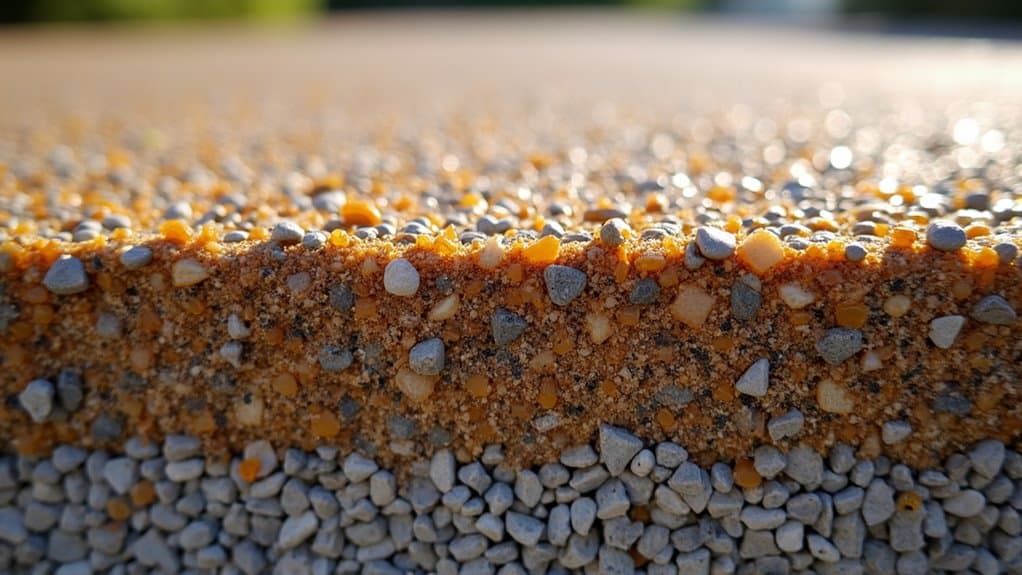
A solid sub-base proves crucial for any resin bound surface, much like the foundations of a house. Without it, you're likely to face cracks and damage, no matter how good your top layer looks. Think of it as laying a carpet – even the poshest pile won't hide a bumpy floor underneath. A properly compacted sub-base stops movement and settling, helping your resin surface stay crack-free and level for years to come. It's worth getting this bit right from the start, as cutting corners here will cost you more in the long run. Using the recommended MOT type 3 sub-base ensures effective water permeability and stability, which are essential for long-lasting performance. Additionally, a minimum sub-base thickness of 100mm thickness is crucial to provide the necessary support for the resin surface.
Preventing Surface Cracking
Surface cracking in resin bound systems mainly comes down to the strength of your sub-base. A poorly prepared base is the most common culprit, causing instability that damages the surface.
For a concrete sub-base, you'll need:
- Minimum 100mm depth
- C35 design strength
- 25N/mm² compressive strength (BS 8500-2:2015)
Joint reinforcement and proper compaction are crucial to prevent movement. Think of it like building a house – without solid foundations, cracks are inevitable.
For asphalt sub-bases, ensure:
- 100mm minimum thickness
- Full edge restraint
- Proper compaction
Both types need careful preparation to handle British weather, particularly frost cycles that can force the surface to crack. The compatibility of substrates is crucial for pavement integrity, as mismatched materials can lead to further issues down the line.
Using quality materials that work together properly is essential – much like matching the right mortar to your bricks.
Regular checks and quick repairs of any small cracks will keep your resin bound surface looking smart and working properly for years to come.
Enhancing Overall Durability
The durability of a resin bound system relies heavily on its sub-base quality – the foundation supporting the entire structure. Proper sub-base selection is crucial for optimal strength and longevity. The sub-base depth should measure between 100-250mm, using materials such as MOT Type 3, which resists frost damage. Thorough compaction is essential to prevent future deformation or cracking. Additionally, ideal sub-bases such as concrete and tarmac provide not only stability but also enhance the overall performance of the resin bound system.
| Sub-Base Type | Depth Requirement | Key Advantage |
|---|---|---|
| Concrete | Minimum 100mm | High strength and stability |
| Tarmac | At least 100mm | Flexibility and permeability |
| Permeable No Fines Concrete | Varies | Excellent drainage |
| Open Grade Tarmacadam | Minimum 100mm | Durable surface for heavy loads |
| Mesh N Go | Limited excavation | Lightweight and flexible solution |
Adding a geotextile membrane provides extra stability. The sub-base's permeability matters significantly for drainage and SuDS compliance. Think of the sub-base as your home's foundations – get it right, and your resin bound surface will remain stable and crack-free for years to come.
Professional Installation Benefits
Professional Installation Benefits
Opting for professional installation of resin bound systems brings key benefits that boost your project's quality and lifespan. Certified installers know exactly which resin to use and how to prepare the ground properly, ensuring your project meets UK standards. Their expertise covers crucial steps like proper excavation, sub-base preparation and precise mixing of materials, including the recommended mixing ratios for optimal performance.
Professional installers oversee every aspect of the project, keeping a close eye on British weather conditions and temperature – vital factors for proper adhesion and curing. Their specialist equipment ensures even coverage and crisp edges, giving your surface a superior finish. Additionally, professional installation guarantees that the surface is compliant with SUDS regulations, which helps to reduce flood risks and supports effective drainage.
Good after-care support means any snags get sorted quickly during or after installation. By choosing qualified professionals, you'll get a surface that's SUDS compliant, UV resistant and built to last.
Whilst professional installation might cost more initially, it proves cost-effective through reduced maintenance and longer lifespan. Think of it like getting a new kitchen fitted – whilst DIY might save money upfront, professional installation ensures everything works properly and looks spot-on for years to come.
The expertise and proper tools make all the difference to the end result.
Customization Options
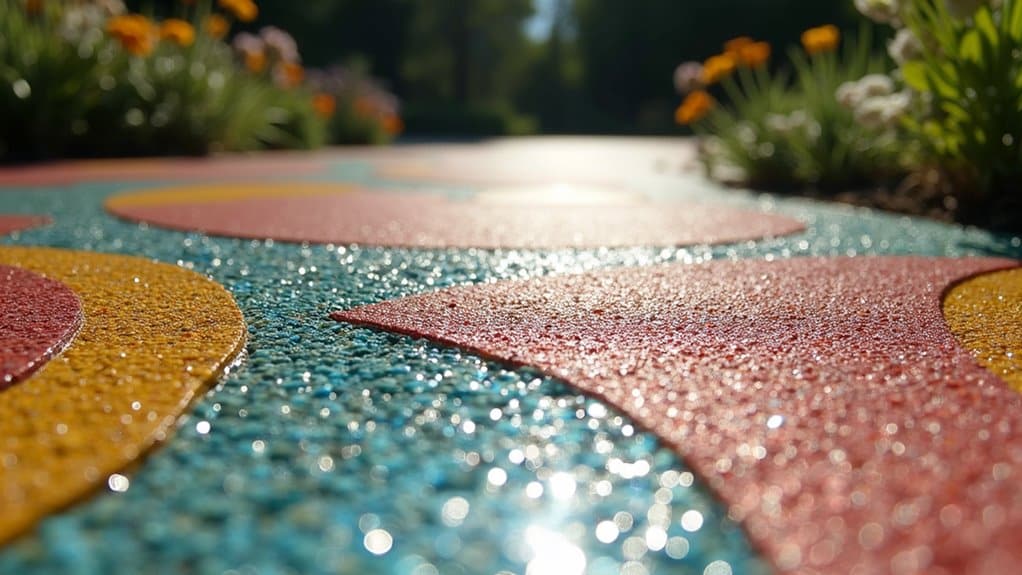
Customisation offers countless ways to make resin bound systems work for your space, both practically and visually.
Choose from natural earth tones or bold colours to match your property or create specific moods. Custom colour blends help achieve unique looks that complement your home's architecture perfectly.
Want to make your space stand out? Add geometric patterns, decorative designs or company logos.
Pick from quality aggregates like marble, granite, quartz or pebbles – each bringing its own character and strength. The system adapts brilliantly to different spaces, including slopes and steps, fitting seamlessly into any garden or driveway. Additionally, the wide range of colours available ensures that your design can be as creative and personalized as you envision. The use of recycled materials in many aggregates also contributes to a more sustainable installation process.
Different textures create safer surfaces, whilst contrasting aggregate edges clearly define spaces.
This flexibility means you'll get exactly what you want – a personalised finish that looks great and performs brilliantly for years.
Safety and Performance
Slip resistance is crucial for resin bound surfaces, particularly during wet and icy British weather. These surfaces can handle heavy use, from daily foot traffic to parked cars, without breaking down or losing their grip. The weather-resistant nature of resin bound paving means it stays safe and sturdy year-round, whether it's facing summer heat or winter frost. This durability ensures that the long-lasting performance of the driveway contributes to ongoing safety for all users. Proper maintenance is essential to support this long lifespan and uphold optimal durability across varying conditions, helping to combat the effects of environmental wear. Think of it like a good pair of walking boots – reliable, grippy and built to last through all conditions.
Slip Resistance Benefits
Slip resistance is vital for safety in wet conditions, and resin-bound systems deliver exceptional grip. The Resin Mill's ResinBound UVR Pro system goes beyond standard safety requirements, as proven by UKSRG and BS EN 14231 testing.
Whilst regulations require a minimum Pendulum Test Value of 36, this system achieves an impressive 51 in wet conditions and 62 in dry conditions. The results from independent tests demonstrate that the system's anti-slip properties significantly exceed current standards.
Adding crushed glass boosts slip resistance even further, reaching 74 in wet conditions at 100gsm. These features make it perfect for busy areas like driveways, pathways, and swimming pool surrounds.
The system's safety credentials are backed by proper certifications, giving homeowners real confidence. The textured finish, created by mixing aggregate particles, significantly cuts down the risk of slips and falls – particularly crucial during Britain's wet weather.
What's more, these surfaces maintain their anti-slip properties through freeze-thaw cycles and need little upkeep to stay safe year after year.
Load-Bearing Capacity
Load-bearing capacity is vital for resin-bound systems, alongside slip resistance. The surface must properly distribute weight, particularly under heavy traffic. A well-designed system should handle axle loads up to 20 tonnes, which works out to 400-800 tonnes per m², varying by stone fill and grid type.
For optimal strength, lay a 20mm resin-bound layer over a 40mm grid. This needs a solid foundation of MOT type 1 or 3 at 120-150mm depth, properly compacted.
A sturdy grid, like X-Grid, is crucial to prevent movement and cracking that could weaken the structure. Additionally, utilizing ground reinforcement grids can enhance stability and reduce the likelihood of such issues.
Your choice of base material – whether macadam or concrete – significantly affects performance. Adding a geotextile membrane improves both stability and water drainage.
Regular load testing ensures your system can handle expected weights, maintaining its strength over time. Getting these elements right means a more reliable resin-bound surface that lasts.
Weather Resistance Features
Weather-resistant resin-bound surfaces are essential for British weather conditions, offering reliable performance year-round. Quality resin withstands both summer heat and winter frost, maintaining its structure and appearance. UV-stable properties prevent sun damage and colour fading, particularly important for our occasional sunny spells.
These surfaces handle British winters remarkably well. The permeable nature allows rainwater to drain quickly, reducing ice formation during freezing temperatures. The material flexes naturally with temperature changes, much like railway tracks are designed to do, preventing cracks from forming. Maintaining an ideal temperature range for laying resin (5 to 25 degrees Celsius) ensures optimal performance and durability.
Our notorious wet weather is well-managed thanks to the surface's quick-drying properties. Water flows through the stone gaps rather than pooling on top, similar to how a garden soakaway works. The stones stay firmly in place even during heavy downpours, common across the UK.
The anti-slip properties are particularly valuable for our climate. Various textures are available, offering good grip in wet or icy conditions – crucial for both family driveways and public spaces.
These practical features make resin-bound surfaces a sensible choice for British weather, from Cornwall's mild winters to Scotland's harsh frosts.
Maintenance Requirements
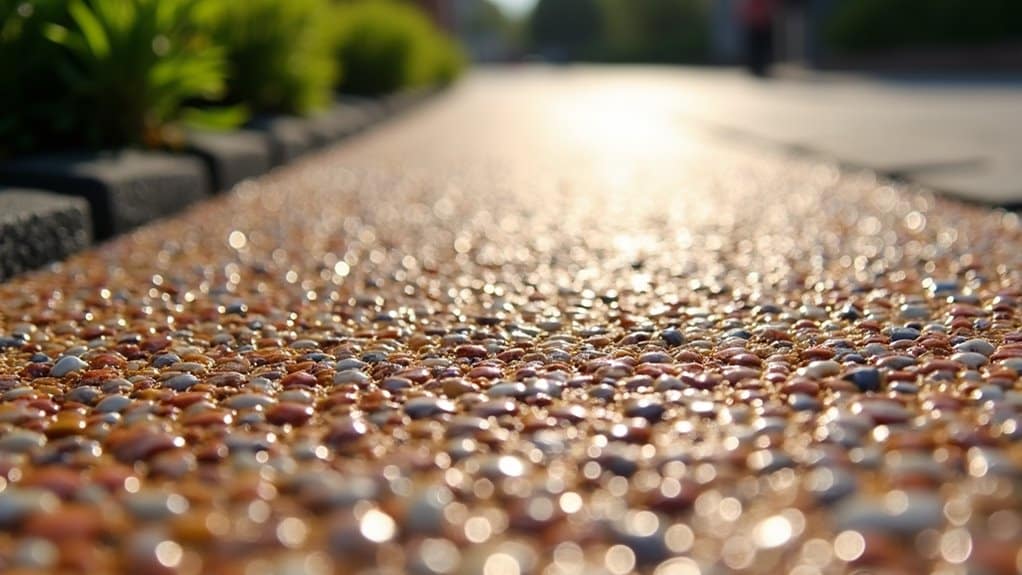
Regular maintenance is vital for keeping resin-bound surfaces in top condition. Clean monthly and tackle seasonal jobs to ensure the surface stays pristine and durable. Use low-pressure washing to shift dirt, algae and light stains – never use high-pressure washers as they'll damage the surface. Keep the area swept clean to stop debris from causing stains. For oil, grease or organic marks, use mild, pH-neutral cleaners straight away. If your surface is in a shady or damp spot, treat it yearly for algae and moss. In winter, only use resin-friendly de-icing salt to tackle ice and snow. Regular sweeping is needed to remove debris and leaves, as it aids in maintaining low maintenance requirements. Conduct a thorough inspection for water pooling regularly to avoid drainage issues. Check regularly for cracks or loose stones – sorting small issues early prevents bigger problems later. Clear fallen leaves promptly in autumn to avoid staining. For thorough cleaning, consider hiring professionals with proper equipment to tackle ground-in dirt. With proper care, resin-bound surfaces typically last 15 to 25 years.
Environmental Considerations
Environmental Considerations
Maintaining resin-bound surfaces properly not only extends their life but delivers real environmental benefits. These surfaces play a vital role in sustainable urban drainage, allowing rainwater to drain naturally through the surface rather than running off into storm drains.
Key benefits include:
- Natural filtration of pollutants before water enters the ground
- Reduced need for replacement due to durability (typically 15-20 years)
- Use of recycled materials, including glass and aggregate
- Their design is influenced by principles of effective weight distribution, ensuring durability and efficient drainage.
The manufacturing process uses less energy than traditional paving methods, resulting in lower carbon emissions. Additionally, the use of permeable surfaces helps to filter pollutants and replenish the water table.
These surfaces help prevent localised flooding, particularly useful in British urban areas where heavy rainfall is common. They also comply with UK Sustainable Urban Drainage Systems (SUDs) regulations, helping maintain natural groundwater levels.
The use of recycled materials in resin-bound surfaces supports the UK's recycling initiatives.
Choosing these systems represents a practical step towards more sustainable construction practices, particularly important given Britain's increasing focus on environmental protection.
Frequently Asked Questions
How Does Weather Affect Resin Bound System Installation?
Weather plays a crucial role when laying resin bound surfaces. Too much rain can prevent proper bonding, whilst extreme heat or cold affects how the resin cures. For best results, install during dry conditions with temperatures between 5-25°C – think typical British spring or autumn weather. Working outside these conditions risks a poor finish and potential system failure.
Can Resin Bound Surfaces Be Repaired if Damaged?
Resin-bound surfaces can indeed be repaired when damaged. A quick assessment will reveal whether you're dealing with minor cracks, similar to those you might spot on a garden path, or more significant damage like the kind caused by heavy vehicles. Small areas can be patched up rather like filling a chip in your car windscreen, whilst larger damaged sections might need removing and resurfacing. Most repairs are straightforward, keeping your driveway or patio looking smart without breaking the bank.
What Colors Are Available for Resin Bound Systems?
Resin bound systems come in a wide spectrum of colours, from rich earthy browns and natural buff tones to sleek greys and contemporary blends. Whether you're matching your driveway to a period property or creating a modern garden path, there's a colour mix to suit. Popular choices include traditional Yorkshire Buff for heritage homes and Charcoal Grey for modern builds.
How Does Resin Bound Compare to Traditional Paving?
Resin bound offers distinct advantages over standard block paving and concrete. Its unique structure holds up remarkably well against British weather, whilst traditional surfaces often crack or develop loose stones. The installation takes just a couple of days compared to the week-long process of laying standard paving slabs. Maintenance-wise, you'll spend far less time dealing with weeds and moss – a common headache with traditional block paving across UK driveways.
Is Resin Bound Suitable for Winter Climates?
Resin bound surfaces stand up brilliantly to British winters. The material handles our freeze-thaw cycles remarkably well, with minimal risk of cracking or damage. When properly laid by qualified installers, these surfaces remain safe and sturdy throughout the cold months, making them ideal for driveways and pathways. Think of it like a proper winter coat – it's designed to handle whatever the weather throws at it whilst keeping its shape and function.
Conclusion
A high-quality resin bound system delivers lasting durability, safety and visual appeal for your outdoor space. UV-stable materials and proper water drainage help these surfaces cope brilliantly with British weather, whilst a properly installed sub-base ensures reliable performance year after year. Whether you opt for traditional greys or contemporary colours, the finish complements any property style. Regular sweeping and occasional pressure washing keep these surfaces in top condition, making them a practical, long-term investment for UK homes and businesses.
